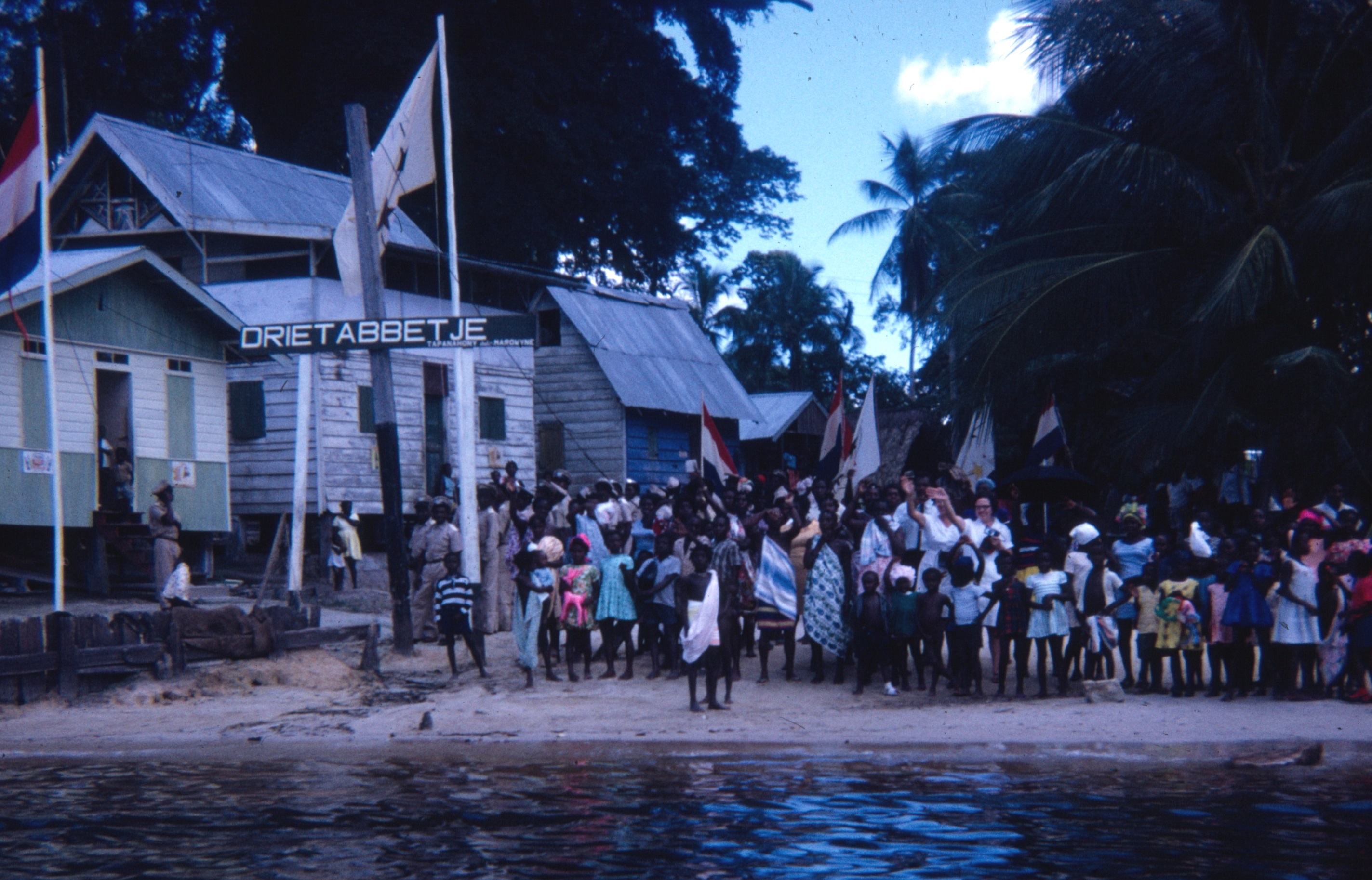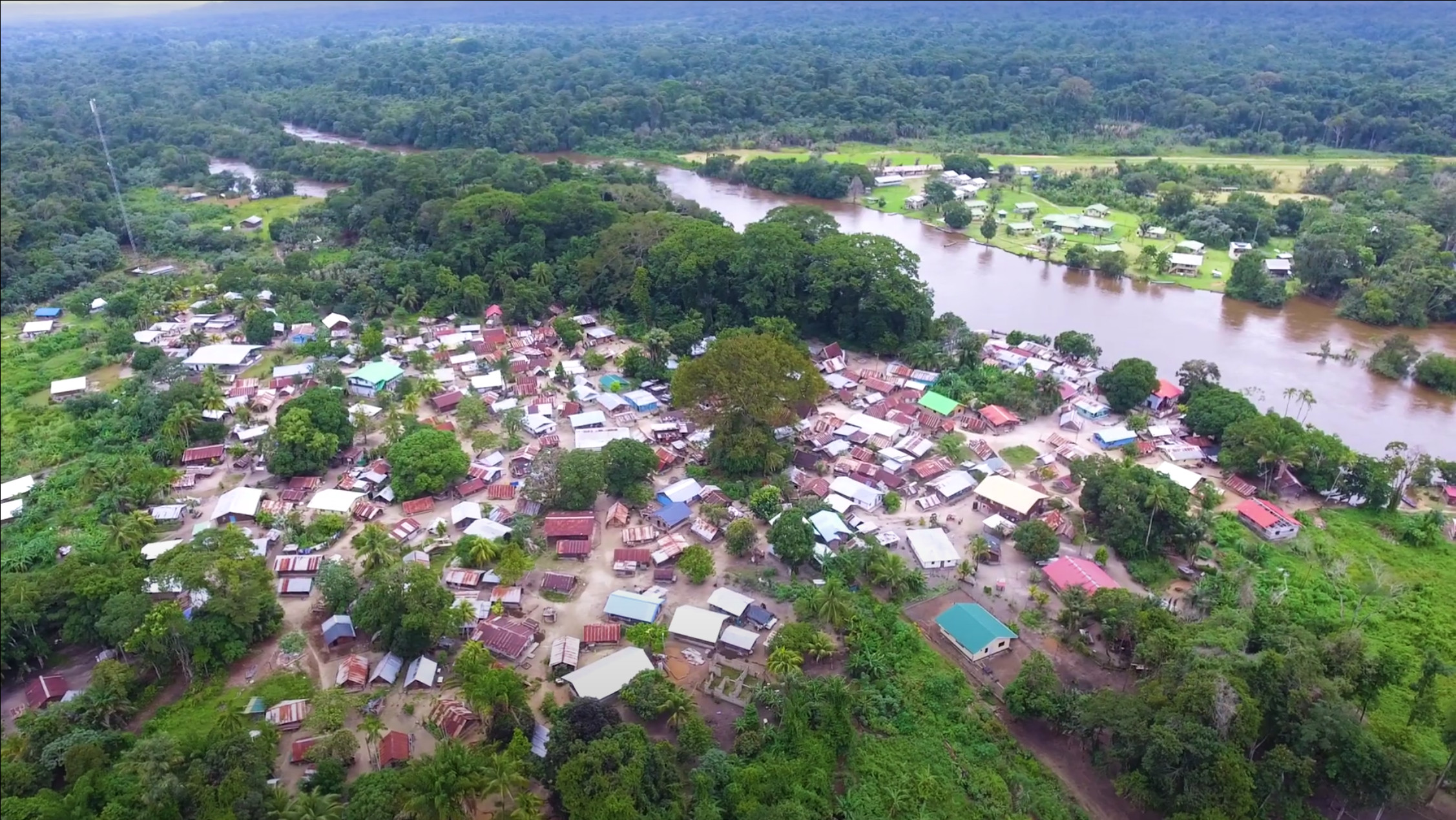Drietabbetje 1969 on:
[Wikipedia]
[Google]
[Amazon]
 Diitabiki (
Diitabiki (

 Diitabiki (
Diitabiki (Sranan Tongo
Sranan Tongo (Sranantongo, "Surinamese tongue", Sranan, Surinamese Creole) is an English-based creole language from Suriname, in South America, where it is the first or second language for 519,600 Surinamese people (approximately 80% of the popu ...
: ''Dritabiki'', Dutch
Dutch or Nederlands commonly refers to:
* Something of, from, or related to the Netherlands
** Dutch people as an ethnic group ()
** Dutch nationality law, history and regulations of Dutch citizenship ()
** Dutch language ()
* In specific terms, i ...
: ''Drietabbetje'') is a Ndyuka village in the Sipaliwini District
Sipaliwini is the largest Districts of Suriname, district of Suriname, located in the south. Sipaliwini is the only district that does not have a regional capital, as it is directly administered by the national government in Paramaribo. Sipaliwini ...
of Suriname
Suriname, officially the Republic of Suriname, is a country in northern South America, also considered as part of the Caribbean and the West Indies. It is a developing country with a Human Development Index, high level of human development; i ...
. Diitabiki is the residence of the gaanman of the Ndyuka people
The Ndyuka people (also spelled 'Djuka') or Aukan people (''Okanisi''), are one of six Maroon peoples (formerly called "Bush Negroes", which has pejorative associations) in the Republic of Suriname and one of the Maroon peoples in French Gui ...
, since 1950, and the location of the oracle
An oracle is a person or thing considered to provide insight, wise counsel or prophetic predictions, most notably including precognition of the future, inspired by deities. If done through occultic means, it is a form of divination.
Descript ...
.
Name
Both the Ndyuka andSranan Tongo
Sranan Tongo (Sranantongo, "Surinamese tongue", Sranan, Surinamese Creole) is an English-based creole language from Suriname, in South America, where it is the first or second language for 519,600 Surinamese people (approximately 80% of the popu ...
name for the village translates to "three islands," with the word ''tabiki'' meaning "island" in both languages. While ''drie'' indeed also translates as "three" in the Dutch language
Dutch ( ) is a West Germanic languages, West Germanic language of the Indo-European language family, spoken by about 25 million people as a first language and 5 million as a second language and is the List of languages by total number of speak ...
, the word ''tabbetje'' is a homophonic translation
Homophonic translation renders a text in one language into a near-homophonic text in another language, usually with no attempt to preserve the original meaning of the text. For example, the English "sat on a wall" is rendered as French "" (liter ...
of the Ndyuka word.
History
The Ndyuka people are ofAfrica
Africa is the world's second-largest and second-most populous continent after Asia. At about 30.3 million km2 (11.7 million square miles) including adjacent islands, it covers 20% of Earth's land area and 6% of its total surfac ...
n descent, and were shipped as slaves to Suriname in the 17-18th century to work on Dutch
Dutch or Nederlands commonly refers to:
* Something of, from, or related to the Netherlands
** Dutch people as an ethnic group ()
** Dutch nationality law, history and regulations of Dutch citizenship ()
** Dutch language ()
* In specific terms, i ...
-owned colonial plantations. The escaped slaves moved into the rainforest
Rainforests are forests characterized by a closed and continuous tree Canopy (biology), canopy, moisture-dependent vegetation, the presence of epiphytes and lianas and the absence of wildfire. Rainforests can be generally classified as tropi ...
, and banded together. There were frequent clashes between the colonists and the Ndyuka, however in 1760, a peace treaty was signed granting the Ndyuka autonomy. From 1761 onwards, the Ndyuka gradually moved southwards in order to protected themselves from the colonists
A settler or a colonist is a person who establishes or joins a permanent presence that is separate to existing communities. The entity that a settler establishes is a settlement. A settler is called a pioneer if they are among the first settli ...
, and started to build villages on the Tapanahoni River
The Tapanahony River (sometimes called Tapanahoni) is a major river in the south eastern part of Suriname, South America. The river originates in the Southern part of the Eilerts de Haan Mountains, near the border with Brazil. It joins the Marowijn ...
dispelling the indigenous Tiriyó. Diitabiki is one of the villages. Slaves who had recently fled from Armina and Boven Commewijne were stationed near the confluence of the Tapanahoni and Lawa River to guard against attacks by the Aluku
The Aluku are a Bushinengue ethnic group living mainly on the riverbank in Maripasoula in southwest French Guiana. The group are sometimes called Boni, referring to the 18th-century leader, Boni (guerrilla leader), Bokilifu Boni.
History
The ...
.
Education
Since the 1960s, Diitabiki is home to the Granman Akontoe Velantieprimary school
A primary school (in Ireland, India, the United Kingdom, Australia, New Zealand, Trinidad and Tobago, Jamaica, South Africa, and Singapore), elementary school, or grade school (in North America and the Philippines) is a school for primary ...
, which as of 2015 has 333 pupils. In 2015, volunteers from Diitabiki and its surroundings extended the school with an extra classroom.
Healthcare
Diitabiki is home to aMedische Zending
Medische Zending Primary Health Care Suriname, commonly known as Medische Zending (Dutch language, Dutch for "medical mission") or MZ is a Surinamese charitable organization offering primary healthcare to remote villages in the interior of Suriname ...
healthcare centre.
Energy
Between 1985 and 1987, electricity was provided by anoverhead power line
An overhead power line is a structure used in electric power transmission and distribution to transmit electrical energy along large distances. It consists of one or more conductors (commonly multiples of three) suspended by towers or poles. ...
connected to the Puketi hydroelectric power plant. After this power plant stopped working during the Surinamese Interior War
The Surinamese Interior War () was a civil war fought in eastern Suriname between 1986 and 1992. The conflict primarily involved the Jungle Commando, a rebel group composed largely of Saramaka (Maroon) fighters and led by former soldier Ronnie ...
there have been attempts to rehabilitate the facility, but after a university delegation in 2003 and 2004 investigated the possibilities for hydroelectric power in the region, the Ministry for Regional Development decided to instead fund the construction of a larger hydroelectric power plant at the Gran Olo rapids nearby. Although it will initially only power Puketi and Futupasi, the plan is to eventually connect Diitabiki to the grid as well. As of 2016, the Gran Olo power plant is still under construction.
Transportation

By air
Diitabiki is served byDrietabbetje Airstrip
Drietabbetje Airstrip serves the Tapanahony River village of Drietabbetje, Suriname
Suriname, officially the Republic of Suriname, is a country in northern South America, also considered as part of the Caribbean and the West Indies. It i ...
, offering Blue Wings and Gum Air
Gum Air is a Surinamese airline based in Paramaribo, Suriname. Gum Air cooperates with Trans Guyana Airways to provide daily flights between Eduard Alexander Gummels International Airport in Paramaribo, Suriname and Ogle Airport in Georgetown, ...
scheduled services from Paramaribo
Paramaribo ( , , ) is the capital city, capital and largest city of Suriname, located on the banks of the Suriname River in the Paramaribo District. Paramaribo has a population of roughly 241,000 people (2012 census), almost half of Suriname's p ...
.
By boat and rail
Diitabaki is close to the villages of Mainsi, andMoitaki
Moitaki is a Ndyuka village in the Sipaliwini District of Suriname. The village is inhabited by the Misidyan clan or ''lo''. The late gaanman Gazon Matodya was born in Moitaki.
Moitaki is situated near the Gran Olo rapids between the village of ...
. The Granholo waterfalls cannot be crossed by boat. A railway line has been built at Futupasi to cross the waterfalls, and since February 2008, a ferry service has been opened to Puketi and Godo Holo
Godo Holo (also Godo Olo) is a group of villages in the Tapanahony resort of the Sipaliwini District of Suriname. The villages are inhabited by Maroon people, Maroons of the Ndyuka people.
Godo Olo is the name for a group of three neighbouring vi ...
.
Tourism
Several holiday resorts have opened in or near Diitabiki, andecotourism
Ecotourism is a form of nature-oriented tourism intended to contribute to the Ecological conservation, conservation of the natural environment, generally defined as being minimally impactful, and including providing both contributions to conserv ...
is actively being promoted. The village is promoting itself as a tourist destination, and tour operators are offering tours to Diitabiki, and the surrounding nature.
Notes
References
*External links
{{Surinamese District Sipaliwini Islands of Suriname Ndyuka settlements Populated places in Sipaliwini District